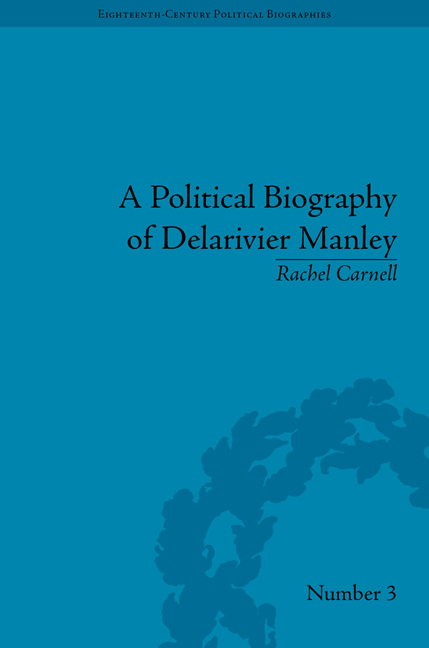Book contents
- Frontmatter
- CONTENTS
- The Author
- Dedication
- Acknowledgements
- A Note on Dates
- Manley Family Tree
- Introduction
- 1 ‘A Long Untainted Descent’: Her Father's Daughter?
- 2 Roger Manley: ‘A Scholar in the Midst of a Camp’
- 3 A ‘Liberal Education’: Youth and Early Life in London
- 4 A ‘Female Wit’: 1694–6
- 5 ‘Some More [and Less] Profitable Employ’: 1697–1705
- 6 Not Yet a Propaganda Writer: 1705–8
- 7 ‘[T]hrowing the First Stone’: 1709
- 8 Writing under a Tory Ministry: 1710–14
- 9 A Celebrated ‘Muse’: 1714–24
- Notes
- Works Cited
- Index
4 - A ‘Female Wit’: 1694–6
- Frontmatter
- CONTENTS
- The Author
- Dedication
- Acknowledgements
- A Note on Dates
- Manley Family Tree
- Introduction
- 1 ‘A Long Untainted Descent’: Her Father's Daughter?
- 2 Roger Manley: ‘A Scholar in the Midst of a Camp’
- 3 A ‘Liberal Education’: Youth and Early Life in London
- 4 A ‘Female Wit’: 1694–6
- 5 ‘Some More [and Less] Profitable Employ’: 1697–1705
- 6 Not Yet a Propaganda Writer: 1705–8
- 7 ‘[T]hrowing the First Stone’: 1709
- 8 Writing under a Tory Ministry: 1710–14
- 9 A Celebrated ‘Muse’: 1714–24
- Notes
- Works Cited
- Index
Summary
The dates in Letters Writen by Mrs. Manley, a short autobiographical epistolary narrative of a journey from London to Exeter, suggest that Manley took the stagecoach to Exeter in June 1694. At this time, she was probably short of money and may have had creditors to pay. She might possibly have been pregnant. She might also have been beginning to think of trying her hand at writing. She was probably back in London by late 1695, as Letters Writen was advertised in late February 1696. Her first play, The Lost Lover; or The Jealous Husband: A Comedy, was produced by Skipwith and Rich's Drury Lane Theatre in about March 1696 and her second play, The Royal Mischief: A Tragedy, was produced by Betterton, Barry and Bracegirdle's rival theatre company at Lincoln's Inn Fields in about May of the same year.
The narrator of Rivella suggests that following her journey to Exeter, Manley spent ‘Two Years’ away from London. The stagecoach journey described in Letters Writen suggests that Manley headed originally to Exeter, but she could not have acquired her knowledge of the theatre from her time in Devon or Cornwall. After the closing of the theatres during the Civil Wars and the Interregnum, many of the major towns in the West Country, including Exeter, continued to feel the anti-theatre influence of religious dissenters into the 1680s. The West Country also suffered more than any other part of England from the Assizes following Monmouth's 1685 landing in Lyme Regis, Dorset. Although there may have been some informal theatrical productions staged in pubs and inns during the decades following the Restoration, no theatres reopened in the West Country until 1705, when one opened in Bath. Manley's knowledge of the major works of Restoration comedy and tragedy and her familiarity with the acting styles of the major comedians and tragedians of her day, therefore, almost certainly came from her having frequented the theatre in London both before and after her stay in the West Country.
- Type
- Chapter
- Information
- A Political Biography of Delarivier Manley , pp. 83 - 112Publisher: Pickering & ChattoFirst published in: 2014



